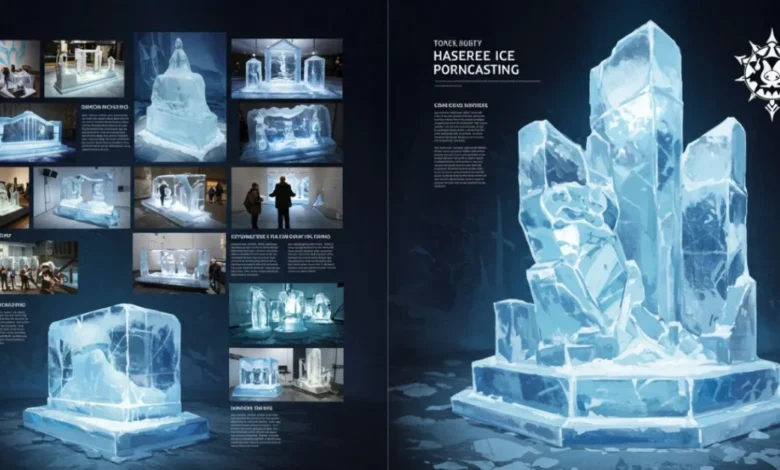Iceporncasting: Understanding the Keyword, Its Rise, and Internet Culture

Introduction: The Curiosity Behind “Iceporncasting”
Iceporncasting Every so often, the internet throws out a strange keyword that starts appearing in search trends, online discussions, or even social media feeds. One of those unusual terms is “iceporncasting.” At first glance, the keyword sounds confusing, unconventional, and perhaps even controversial. But what makes it interesting is not necessarily the literal meaning—it’s how such terms spread, why people search for them, and what they reveal about internet behavior.
In a world where digital attention is everything, odd keywords often catch on and spark curiosity. Whether it’s through accidental discovery, search engine optimization (SEO) strategies, or simply internet culture’s fascination with the unusual, “iceporncasting” has become a phrase that people want to learn more about. This article takes a deep dive into the keyword, exploring its background, cultural context, and the broader lessons it offers about online trends.
By the end, you’ll see that “iceporncasting” is less about the literal and more about what it teaches us regarding internet culture, human curiosity, and the evolution of digital content.
The Anatomy of Unusual Internet Keywords

Before we break down “iceporncasting,” it’s important to understand why unusual keywords gain traction in the first place. Search engines thrive on curiosity. The more odd or unfamiliar a term is, the more likely people are to type it into Google just to see what it means. This simple human urge to satisfy curiosity fuels the growth of many internet trends.
“Iceporncasting” fits into this category perfectly. It doesn’t immediately make sense, but that’s the point—it intrigues people. Keywords like this often get picked up by blogs, forums, and even meme culture. Once it circulates widely enough, it creates a feedback loop where people search for it simply because others are searching for it.
This process reflects the deeper psychology of internet culture: we’re naturally drawn to the strange, the unexplained, and the edgy. Whether the keyword was invented for shock value, for marketing, or simply as an internet joke, the fact that it continues to draw attention speaks volumes about how the online ecosystem works.
Breaking Down the Word: Why “Iceporncasting” Stands Out
Let’s take a closer look at the word itself. “Iceporncasting” appears to be a combination of several different terms mashed together, which adds to its intrigue. The “ice” part might suggest something cold, sharp, or even trendy (as in “ice” being slang for something stylish). The “casting” element hints at performance, auditioning, or broadcasting. Combined with the middle part of the word, it creates an odd, edgy phrase that instantly feels like it belongs to underground internet culture.
This unusual structure is what makes the keyword memorable. Many viral terms online work in the same way—they don’t necessarily make logical sense, but they’re catchy enough that people remember them. In an era where thousands of new terms pop up every day, standing out is all about being different. “Iceporncasting” achieves that simply by being strange, controversial, and impossible to ignore.
The uniqueness of the keyword is also why it shows up in discussions about SEO and digital marketing. Experts often point out that niche or unusual keywords can drive traffic simply because they tap into people’s curiosity. “Iceporncasting,” while odd, serves as a textbook example of this principle.
Internet Curiosity and the Power of Search
One of the most fascinating aspects of “iceporncasting” is how it highlights the power of search behavior. People are naturally curious about things they don’t understand. If they see a strange word on a forum, a social media comment, or even in a random conversation, their first instinct is to type it into a search engine.
This act of searching creates demand where none existed before. Over time, the keyword starts appearing in autocomplete suggestions, trending lists, and even analytics reports. Suddenly, what began as a niche or made-up word transforms into a widely searched term.
The cycle demonstrates how the internet magnifies curiosity. A single unfamiliar word can create thousands of searches, leading websites, bloggers, and even content creators to build content around it. In this sense, “iceporncasting” is not just a strange keyword—it’s an example of how digital culture feeds on itself, turning the unknown into the popular.
The Risks and Misunderstandings Around Keywords Like This
Of course, with odd keywords come risks. Not every term people stumble upon is safe or trustworthy. Searching for words like “iceporncasting” without context can sometimes lead users to questionable websites, misinformation, or even harmful content. This is why digital literacy is so important in today’s world.
When we encounter an unusual keyword, it’s smart to think critically about where it comes from. Is it part of a genuine trend? Was it created for marketing? Or is it potentially connected to content that isn’t safe for everyone? Being cautious doesn’t mean avoiding curiosity—it simply means approaching it with awareness.
For parents, educators, and everyday internet users, this is a reminder that not everything trending online is worth diving into blindly. At the same time, it also highlights how essential it is to understand how keywords spread and why they capture so much attention.
SEO Lessons From “Iceporncasting”
For digital marketers, “iceporncasting” provides an unexpected case study. While it might seem like just a random term, its popularity underlines several important SEO lessons:
- Curiosity Drives Traffic – People are far more likely to click on or search for something unusual than something predictable.
- Niche Keywords Can Gain Traction – You don’t always need mainstream terms to attract attention. Sometimes, the strangest keywords perform better.
- Trend Amplification – Once a keyword begins trending, content creators rush to capitalize on it, which further boosts its presence online.
Marketers who study terms like “iceporncasting” can learn how to harness the power of curiosity without needing massive advertising budgets. The keyword itself may not be practical for every brand, but the principle behind its rise applies across industries: be different, be memorable, and spark curiosity.
The Cultural Side of Strange Keywords
Beyond marketing and SEO, words like “iceporncasting” show how internet culture thrives on the bizarre. Memes, viral challenges, and odd phrases all share the same DNA—they exist because people love sharing what’s unusual.
In many ways, this is a form of digital storytelling. When a strange keyword pops up, people create narratives around it. They speculate on its origins, make jokes, or turn it into a meme. Over time, the keyword becomes more than just a word—it becomes part of internet folklore.
“Iceporncasting” is a prime example of this phenomenon. Whether people take it seriously, laugh at it, or use it in online discussions, the fact that it sticks in people’s minds shows how powerful unusual terms can be in shaping online culture.
Final Thoughts: More Than Just a Keyword
At first glance, “iceporncasting” may seem like a meaningless or confusing phrase. But when you step back, it reveals something deeper about the internet itself. It shows how curiosity fuels search behavior, how unusual terms can dominate attention, and how digital culture thrives on the odd and the unexplained.
For everyday internet users, it’s a reminder to approach unusual keywords with both curiosity and caution. For marketers and content creators, it’s a case study in how unpredictability can drive online trends. And for anyone fascinated by internet culture, it’s yet another example of how the digital world transforms the strange into the mainstream.
So while “iceporncasting” might just be one of countless odd keywords floating around the internet, its existence tells us a lot about how we interact with the web, with each other, and with the power of words themselves.



